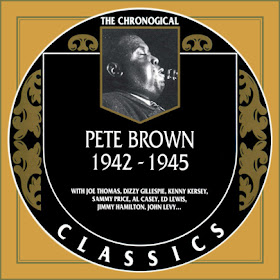James Ostend "Pete" Brown (November 9, 1906,
Baltimore, Maryland - September 20, 1963, New York City, New York) was an
American jazz alto saxophonist and bandleader.
Brown learned to play piano, trumpet, and saxophone while
young. He played in New York with Bernie Robinson's orchestra in 1928, and
played from 1928 to 1934 with Charlie Skeets. In 1937 he worked in the band of
John Kirby; for several years in the 1930s he worked with Frankie Newton, who
was also a member of Kirby's  band. Brown and Newton recorded often.
band. Brown and Newton recorded often.
 band. Brown and Newton recorded often.
band. Brown and Newton recorded often.
In addition to recording under his own name, Brown also
recorded as a session musician with Willie "The Lion" Smith, Jimmie
Noone, Buster Bailey, Leonard Feather, Joe Marsala, and Maxine Sullivan in the
1930s. He worked on 52nd Street in New York in the 1940s, both as a sideman
(with Slim Gaillard, among others) and as a bandleader.
In 1943 he fronted Louis Jordan's band while the rising
R&B star conducted a solo tour. In January of 1944, Brown included
trumpeter Jonah Jones in a group that cut a handful of titles for the World
Broadcasting Radio Transcription Service. A quartet date featuring guitarist
"Jim Daddy" Walker and a series of Savoy and Keynote sessions from
this period show him at the peak of his powers as a swinging balladeer and a
restless, brusquely inventive improviser.
Here's Pete Brown's All Star Quintet with "It's The Talk Of The Town" from above album.
 Blue
Blazers backed the volatile and at times homicidal-sounding blues shouter
Cousin Joe (aka Pleasant Joseph).
Blue
Blazers backed the volatile and at times homicidal-sounding blues shouter
Cousin Joe (aka Pleasant Joseph).
Pete Brown was a large man who suffered from diabetes and
other health problems that gradually limited his professional activity and
affected his musicianship, at times causing him to coast rather than innovate.
In the 1950s Brown's health began to fail, and he receded
from full-time performance. He played with Joe Wilder (1954), Big Joe Turner
(1956), Sammy Price, and Champion Jack Dupree, and  appeared at the 1957 Newport
Jazz Festival with Coleman Hawkins and Roy Eldridge. His last appearance was in
1960 with Dizzy Gillespie.
appeared at the 1957 Newport
Jazz Festival with Coleman Hawkins and Roy Eldridge. His last appearance was in
1960 with Dizzy Gillespie.
 appeared at the 1957 Newport
Jazz Festival with Coleman Hawkins and Roy Eldridge. His last appearance was in
1960 with Dizzy Gillespie.
appeared at the 1957 Newport
Jazz Festival with Coleman Hawkins and Roy Eldridge. His last appearance was in
1960 with Dizzy Gillespie.
A victim of ailments brought on by years of unhealthy behaviour,
Pete Brown passed away on September 20, 1963.
For most of his life he gave lessons to aspiring saxophonists. Two who are known to have learned their craft from him were Flip Phillips and Cecil Payne. (Info edited from Wikipedia & AMG)
For most of his life he gave lessons to aspiring saxophonists. Two who are known to have learned their craft from him were Flip Phillips and Cecil Payne. (Info edited from Wikipedia & AMG)


For The Chronological Classics: Pete Brown 1942-1945 go here:
ReplyDeletehttp://www50.zippyshare.com/v/19jSyOF4/file.html
Pete Brown and His Band
01. Cannon Ball
Pete Brown Quartet
02. Jim's Idea
03. Pete's Idea
Pete Brown Quintette
04. Ooh-Wee
05. Bellevue For you
06. Pete's Brown Boogie (P.B. Boogie)
07. Moppin' The Blues
Pete Brown's All Star Quintet
08. It All Depends On You
09. That's My Weakness Now
10. It's The Talk Of The Town
11. I May Be Wrong
Pete Brown's Band
12. Boot Zoot
13. It's Great
14. Lazy Day
15. Sunshine Blues
Pete Brown's Sextette
16. Fat Man's Boogie (Big Boy Boogie)
17. That's The Curfew
18. Midnite Blues
19. That's It
20. Just Plain Shuffle
21. Pushin The Mop
This Chronological Classics CD collects just about all of Pete Brown's commercially released 78 rpm recordings under his own name. And they are terrific recordings at that. "Cannon ball," with Dizzy Gillespie on trumpet and Nora Lee King singing the vocal, swings mightily and is excellent. So too are "That's my weakness now" and "I may be wrong," both from a Keynote date done in 1944 with Joe Thomas on trumpet. Everything on this CD, however, gives pleasure; Pete Brown was a great alto saxophonist whose work should be better known.